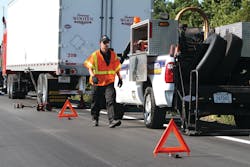As fleets continue to look for ways to implement cost controls and efficiencies, more and more are outsourcing some or all of their service work. One of the most important factors in selecting a service provider is vehicle downtime.
Yet, there is no industry definition of “downtime.” Is downtime for all repair events? Only for unscheduled events? Just for repair work done at outside shops?
For some fleets, the downtime clock starts when the truck gets to a shop and ends when the truck is ready to be picked up. Other fleets start downtime when they receive a breakdown call and stop the downtime clock when the truck is back on the road performing its job.
There are fleets that consider the beginning of downtime when a technician starts to work on a truck and the end of downtime when the repair order is closed. Still others start downtime when an estimate is given for the truck repair and the end when the truck is picked up.
It’s the same situation for vehicle dealers and service providers. They, too, use different start and stop points for vehicle downtime.
Standards of Performance Measurement
Nor are there any common methods for tracking vehicle downtime, such as key performance indicators - a set of quantifiable measurements used to gauge or compare performance - to judge service providers.
Downtime metrics can be average downtime hours per day, days of downtime per event, vehicle downtime per month, total downtime hours, total wrench time, estimate and approval time and so on.
Industry Look-See
The Technology & Maintenance Council (TMC), within its S.5 Fleet Maintenance Management Study Group, has created a task force to work on developing a method for universal downtime tracking. Its objective, explains Jack Porter of Decisiv, a Service Relationship Management (SRM) platform provider, who chairs this task force, is to craft a TMC Recommended Maintenance Practice (RP).
TMC is North America’s premier technical society for truck equipment technology and maintenance professionals. Its RPs are voluntary practices that assist equipment users, vehicle/component manufacturers and other industry suppliers in the maintenance of commercial vehicle equipment.
The Cost of Downtime
The TMC’s Universal Downtime Tracking Task Force is working to come up with a common way to measure the multitude of consequential costs associated with vehicle downtime. These can include:
- Lost vehicle revenue opportunity per day.
- Costs associated with the loss of a driver’s productive time.
- Costs associated with the disruption of a technician’s scheduled work to handle an unscheduled repair.
- Costs imposed as a penalty when a load is not delivered on time.
- Costs that result when a truck breaks down, losing its availability and causing other vehicles and drivers to work harder to cover the demand.
- Costs that can occur when the vehicle failure and downtime forces inefficient alternative methods to deliver the load at a higher cost.
Depending on the fleet, downtime can average up to about $800 per day in lost revenue, notes Porter.
Apples-to-Apples Comparisons
Once a common definition for vehicle downtime is created and a start and stop time is established, the task force can then craft quantifiable measurements, Porter says. With these, users can make similar comparisons and use industry benchmarks to make more data driven, qualitative decisions, not only in selecting high-quality service providers but for tracking equipment life and reliability.
Other benefits to be reaped from having a universal downtime tracking method, he adds, include help with:
- Evaluating equipment utilization.
- Gauging a service network’s efficiency.
- Objectively measuring internal versus external shops.
- Checking the performance of equipment and service providers.
- Reducing hidden downtime costs.
- Increasing the bottom line.
The Universal Downtime Tracking Task Force hopes to have a TMC Recommended Practice ready for review by April 2014.
Porter welcomes any thoughts, ideas and suggestions on universal downtime tracking. He may be contacted by phone at (206) 669-442 or by e-mail at [email protected].
About the Author

